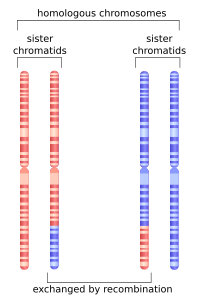
Photo from wikipedia
DNA polymerase theta (Polq) is important for the proliferation of BRCA-deficient cancer cells, but is dispensable for normal cell growth. Thus, Polq is widely considered to be an important new… Click to show full abstract
DNA polymerase theta (Polq) is important for the proliferation of BRCA-deficient cancer cells, but is dispensable for normal cell growth. Thus, Polq is widely considered to be an important new drug target for BRCA-deficient cancers, such as those in the breast, ovary, prostate, pancreas, and blood. We have identified "expanded-size" nucleoside analogs that are uniquely incorporated by Polq and inhibit its activity. We have also identified small-molecule inhibitors of Polq through a random high-throughput screening approach. Consistent with the ability of Polq to promote the survival of BRCA-deficient cells, preliminary studies show that a newly identified Polq small-molecule inhibitor selectively kills cells deficient in BRCA2, while sparing wild-type cells. We are currently further advancing Polq nucleoside analog and small-molecule inhibitors via structure activity relationship (SAR) and medicinal chemistry studies with the goal of testing these inhibitors in BRCA-deficient PDX mouse models. Citation Format: Richard T. Pomerantz. Development of polymerase theta inhibitors for precision medicine in BRCA-deficient cancers [abstract]. In: Proceedings of the AACR-NCI-EORTC International Conference: Molecular Targets and Cancer Therapeutics; 2017 Oct 26-30; Philadelphia, PA. Philadelphia (PA): AACR; Mol Cancer Ther 2018;17(1 Suppl):Abstract nr A107.
Journal Title: Molecular Cancer Therapeutics
Year Published: 2018
Link to full text (if available)
Share on Social Media: Sign Up to like & get
recommendations!